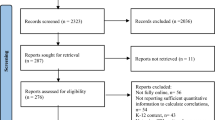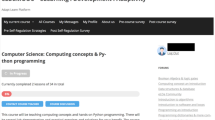Abstract
Self-regulated learning (SRL) is a fundamental skill to succeed in Massive Open Online Courses (MOOCs), but many learners do not know how to self-regulate their learning. The need to support SRL in MOOCs led to the idea of social-psychological interventions that promise to improve course performance and decrease dropout rates. However, past research provides mixed evidence of the effectiveness of SRL interventions in MOOCs. In this randomized control trial (RCT), the heterogeneous effects of SRL intervention in three MOOCs were examined. The SRL intervention was embedded in a precourse survey, where learners were randomly assigned to experimental (N = 383) and control (N = 444) conditions. Both groups answered contextual questions, and then the experimental group was guided through a writing activity to boost SRL skills. The study aimed to assess how learner demographics may affect the results of the RCT. The results yielded no significant differences overall between the experimental and control conditions. However, the results of the binary logistic regression demonstrated that the heterogeneous effect is prevalent in SRL interventions in regard to learner demographics: males and older learners received advantages from the intervention. The current study adds to the field of SRL intervention in MOOCs and presents directions for future experiments. Based on the results of the paper, a number of methodological issues of SRL interventions in MOOCs were formulated, including self-selection bias and interventions that were not a part of the learning process, that focused on academic outcomes, and that had no follow-up analysis.


Similar content being viewed by others
Data Availability
The datasets generated and/or analyzed during the current study are not publicly available but are available from the corresponding author on reasonable request.
Notes
The unequal number of learners in the experimental and control conditions is associated with the peculiarities of the organization of the online survey.
No significant difference: χ2 (1, N = 827) = 1.14, p = 0.29.
No significant difference: t (827) = -1.07, p = 0.15.
No significant difference: χ2 (1, N = 827) = 1.67, p = 0.20.
References
Allison, P. (2012). When can you safely ignore multicollinearity? Statistical Horizons. Retrieved from https://statisticalhorizons.com/multicollinearity
Barnard, L., Paton, V., & Lan, W. (2010). Profiles in self-regulated learning in the online learning environment. International Review of Research in Open and Distance Learning, 11(1), 61–80.
Cazan, A. M. (2020). An intervention study for the development of self-regulated learning skills. Current Psychology. https://doi.org/10.1007/s12144-020-01136-x
Cerón, J., Baldiris, S., Quintero, J., Rubira, R., Velez, G., Graf, S., & De La Fuente, L. (2020). Self-regulated learning in massive online open courses: A state-of-the-art review. IEEE Access, 8, 511–528. https://doi.org/10.1109/ACCESS.2020.3045913
Clark, D., Gill, D., Prowse, V., & Rush, M. (2020). Using goals to motivate college students: Theory and evidence from field experiments. Review of Economics and Statistics, 102(4), 648–663. https://doi.org/10.3386/w23638
Damgaard, M. T., & Nielsen, H. S. (2018). Nudging in education. Economics of Education Review, 64, 313–342. https://doi.org/10.1016/j.econedurev.2018.03.008
Davis, D., Chen, G., Van der Zee, T., Hauff, C., & Houben, G. J. (2016). Retrieval practice and study planning in MOOCs: Exploring classroom-based self-regulated learning strategies at scale. In European conference on technology enhanced learning (pp. 57–71). https://doi.org/10.1007/978-3-319-45153-4_5
Greene, J. A., & Azevedo, R. (2007). A theoretical review of Winne and Hadwin’s model of self-regulated learning: New perspectives and directions. Review of Educational Research, 77(3), 334–372. https://doi.org/10.3102/003465430303953
Grove, W. A., & Wasserman, T. (2006). Incentives and student learning: A natural experiment with economics problem sets. American Economic Review, 96(2), 447–452. https://doi.org/10.1257/000282806777212224
Healy, P. A. (2017). Georgetown’s first six MOOCs: Completion, intention, and gender achievement gaps. Undergraduate Economic Review, 14(1), 1–37.
Jansen, R. S., van Leeuwen, A., Janssen, J., Conijn, R., & Kester, L. (2020). Supporting learners’ self-regulated learning in massive open online courses. Computers & Education, 146, 1–17. https://doi.org/10.1016/j.compedu.2019.103771
Jensen, R. (2010). The (perceived) returns to education and the demand for schooling. The Quarterly Journal of Economics, 125(2), 515–548. https://doi.org/10.1162/qjec.2010.125.2.515
Kizilcec, R. F., & Brooks, C. (2017). Diverse big data and randomized field experiments in MOOCs. Handbook of learning analytics, pp. 211–222. https://doi.org/10.18608/hla17.018
Kizilcec, R. F., & Cohen, G. L. (2017). Eight-minute self-regulation intervention raises educational attainment at scale in individualist but not collectivist cultures. Proceedings of the National Academy of Sciences, 114(17), 4348–4353. https://doi.org/10.1073/pnas.1611898114
Kizilcec, R. F., Pérez-Sanagustín, M., & Maldonado, J. J. (2016). Recommending self-regulated learning strategies does not improve performance in a MOOC. In Proceedings of the third (2016) ACM conference on learning@ scale (pp. 101–104). https://doi.org/10.1145/2876034.2893378
Kizilcec, R. F., Piech, C., & Schneider, E. (2013). Deconstructing disengagement: analyzing learner subpopulations in massive open online courses. In Proceedings of the third international conference on learning analytics and knowledge (pp. 170–179). https://doi.org/10.1145/2460296.2460330
Kizilcec, R. F., Reich, J., Yeomans, M., Dann, C., Brunskill, E., Lopez, G., & Tingley, D. (2020). Scaling up behavioral science interventions in online education. Proceedings of the National Academy of Sciences, 117(26), 14900–14905. https://doi.org/10.1073/pnas.1921417117
Kizilcec, R. F., Saltarelli, A. J., Reich, J., & Cohen, G. L. (2017). Closing global achievement gaps in MOOCs. Science, 355(6322), 251–252. https://doi.org/10.1126/science.aag2063
Littlejohn, A., & Milligan, C. (2015). Designing MOOCs for professional learners: Tools and patterns to encourage self-regulated learning. eLearning Papers, 42, 1–10. https://doi.org/10.6084/M9.FIGSHARE.1428569
Maldonado-Mahauad, J., Pérez-Sanagustín, M., Kizilcec, R. F., Morales, N., & Munoz-Gama, J. (2018). Mining theory-based patterns from big data: Identifying self-regulated learning strategies in massive open online courses. Computers in Human Behavior, 80, 179–196. https://doi.org/10.1016/j.chb.2017.11.011
Menard, S. (2002). Applied logistic regression analysis. https://doi.org/10.4135/9781412983433
Milligan, C., Littlejohn, A., & Margaryan, A. (2013). Patterns of engagement in connectivist MOOCs. MERLOT Journal of Online Learning and Teaching, 9(2), 149–159.
Morris, N. P., Swinnerton, B. J., & Hotchkiss, S. (2015). Can demographic information predict MOOC learner outcomes?. In Experience track: proceedings of the European MOOC stakeholder (pp. 199–217).
Panadero, E., Klug, J., & Järvelä, S. (2016). Third wave of measurement in the self-regulated learning field: When measurement and intervention come hand in hand. Scandinavian Journal of Educational Research, 60(6), 723–735.
Pérez-Álvarez, R., Maldonado-Mahauad, J. J., Sapunar-Opazo, D., & Pérez-Sanagustín, M. (2017). NoteMyProgress: A tool to support learners’ self-regulated learning strategies in MOOC environments. In European conference on technology enhanced learning (pp. 460–466). https://doi.org/10.1007/978-3-319-66610-5_43
Pérez-Sanagustín, M., Sapunar-Opazo, D., Pérez-Álvarez, R., Hilliger, I., Bey, A., Maldonado-Mahauad, J., & Baier, J. (2020). A MOOC-based flipped experience: Scaffolding SRL strategies improves learners’ time management and engagement. Computer Applications in Engineering Education. https://doi.org/10.1002/cae.22337
Pintrich, P. R. (2004). A conceptual framework for assessing motivation and self-regulated learning in college students. Educational Psychology Review, 16, 385–407.
Porter, S. R., & Whitcomb, M. E. (2005). Non-response in student surveys: The role of demographics, engagement and personality. Research in Higher Education, 46(2), 127–152. https://doi.org/10.1007/s11162-004-1597-2
Reich, J., & Ruipérez-Valiente, J. A. (2019). The MOOC pivot. Science, 363(6423), 130–131. https://doi.org/10.1126/science.aav7958
Reich, J. (2014). MOOC completion and retention in the context of student intent. Retrieved from https://er.educause.edu/articles/2014/12/mooc-completion-and-retention-in-the-context-of-student-intent
Schippers, M. C., Scheepers, A. W., & Peterson, J. B. (2015). A scalable goal-setting intervention closes both the gender and ethnic minority achievement gap. Palgrave Communications, 1(1), 1–12. https://doi.org/10.1057/palcomms.2015.14
Schumacher, C., & Ifenthaler, D. (2021). Investigating prompts for supporting students’ self-regulation: A remaining challenge for learning analytics approaches? The Internet and Higher Education, 49, 100791. https://doi.org/10.1016/j.iheduc.2020.100791
Semenova, T. (2021). Not only the intention to complete: the role of action-oriented intentions in MOOC completion. Technology, Knowledge and Learning. https://doi.org/10.1007/s10758-021-09534-1
Semenova, T. V., & Rudakova, L. M. (2016). Barriers to taking massive open online courses (MOOCs). Russian Education & Society, 58(3), 228–245. https://doi.org/10.1080/10609393.2016.1242992
Sudman, S., & Bradburn, N. M. (1973). Effects of time and memory factors on response in surveys. Journal of the American Statistical Association, 68(344), 805–815.
van Lent, M., & Souverijn, M. (2017). Goal setting and raising the bar: A field experiment. Tinbergen Institute Discussion Paper, 17–001, 1–54. https://doi.org/10.1016/j.socec.2020.101570
Vilkova, K. (2019). Self-regulated learning and successful MOOC completion. In EMOOCs-WIP (pp. 72–78).
Wang, C. H., Shannon, D. M., & Ross, M. E. (2013). Students’ characteristics, self-regulated learning, technology self-efficacy, and course outcomes in online learning. Distance Education, 34(3), 302–323. https://doi.org/10.1080/01587919.2013.835779
Watson, S. L., Watson, W. R., Yu, J. H., Alamri, H., & Mueller, C. (2017). Learner profiles of attitudinal learning in a MOOC: An explanatory sequential mixed methods study. Computers & Education, 114, 274–285. https://doi.org/10.1016/j.compedu.2017.07.005
Winne, P. H. (2001). Self-regulated learning viewed from models of information processing. Self-regulated learning and academic achievement: Theoretical perspectives, 2, 153–189.
Winne, P. H., & Hadwin, A. F. (2008). The weave of motivation and self-regulated learning. In D. H. Schunk & B. J. Zimmerman (Eds.), Motivation and self-regulated learning: Theory, research and applications (pp. 297–314). Lawrence Erlbaum Associates.
Wong, J., Baars, M., de Koning, B. B., & Paas, F. (2021). Examining the use of prompts to facilitate self-regulated learning in massive open online courses. Computers in Human Behavior, 115, 1–27. https://doi.org/10.1016/j.chb.2020.106596
Yeager, D. S., & Walton, G. M. (2011). Social-psychological interventions in education: They’re not magic. Review of Educational Research, 81(2), 267–301. https://doi.org/10.3102/0034654311405999
Yeomans, M., & Reich, J. (2017). Planning prompts increase and forecast course completion in massive open online courses. In Proceedings of the seventh international learning analytics & knowledge conference (pp. 464–473). https://doi.org/10.1145/3027385.3027416
Zimmerman, B. J., & Schunk, D. H. (Eds.). (2012). Self-regulated learning and academic achievement: Theory, research, and practice. Springer Science & Business Media.
Zimmerman, B. J. (1990). Self-regulated learning and academic achievement: An overview. Educational Psychologist, 25(1), 3–17. https://doi.org/10.1207/s15326985ep2501_2
Acknowledgements
The author expresses gratitude to Natalia Maloshonok for her valuable comments, to Rene Kizilcec for the opportunity to use the intervention materials, and to Tatiana Semenova for assistance with data collection.
Funding
This work was not supported by any of the organizations.
Author information
Authors and Affiliations
Corresponding author
Ethics declarations
Conflict of interest
The author declares that there is no conflict of interest regarding the publication of this article.
Additional information
Publisher's Note
Springer Nature remains neutral with regard to jurisdictional claims in published maps and institutional affiliations.
Rights and permissions
About this article
Cite this article
Vilkova, K. The Promises and Pitfalls of Self-regulated Learning Interventions in MOOCs. Tech Know Learn 27, 689–705 (2022). https://doi.org/10.1007/s10758-021-09580-9
Accepted:
Published:
Issue Date:
DOI: https://doi.org/10.1007/s10758-021-09580-9




